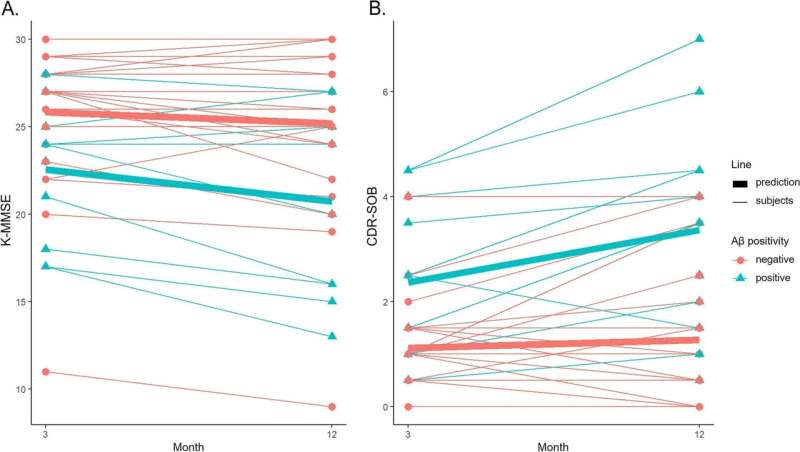This article has been reviewed according to Science X's editorial process and policies. Editors have highlighted the following attributes while ensuring the content's credibility:
fact-checked
peer-reviewed publication
proofread
Study: Amyloid-β protein affects cognitive decline after small-sized cerebral infarction

A research team has confirmed that brain amyloid-β (Aβ) deposition, a biomarker for Alzheimer's disease, is an essential predictor for post-stroke cognitive impairment (PSCI) development and cognitive decline after small-sized cerebral infarction.
Cerebral infarction is the pathologic process that results in an area of necrotic tissue in the brain. It is caused by disrupted blood supply and restricted oxygen supply. When cerebral infarction occurs, brain cells are continuously lost if blood vessel recanalization is not achieved quickly. This would cause great inconvenience in daily life, ultimately leading to permanent disability.
In particular, cognitive function may decline after cerebral infarction. It is generally known that cognitive decline after cerebral infarction occurs when the stroke lesion is large, or brain areas related to cognitive function are damaged at the time of cerebral infarction, but in the case of small-sized cerebral infarction, cognitive function may decline even when the two risk factors mentioned above are not present. The predictive factors for this are not yet apparent.
The research team of Prof. Sung Hoon Kang, Chi Kyung Kim, and Jae Seon Eo conducted a study on 37 patients aged ≥50 years with first-ever small subcortical infarction. After three months of the cerebral infarction occurrence, a comprehensive neuropsychological battery and Aβ PET were performed to determine whether there was a decline in cognitive function and amyloid deposition after the cerebral infarction.
One year later, a simple cognitive function test and clinical dementia rating scale were conducted to confirm long-term changes in cognitive function.
As a result, 11 out of 37 patients (29.7%) with cerebral infarction were confirmed to have Aβ deposition, and 7 out of 11 patients (63.6%) with confirmed Aβ accumulation were diagnosed with cognitive impairment after cerebral infarction. This study found that Aβ deposition is significantly related to developing PSCI in patients with small subcortical infarction. Additionally, the study confirmed that Aβ deposition is associated with poor cognitive trajectory over one year.
Prof. Sung Hoon Kang stated that "according to the present study, we were able to confirm that Aβ deposition, a biomarker for Alzheimer's disease, is a predictor for PSCI development and cognitive decline over one year in patients with small-sized cerebral infarction. In particular, it provides evidence that Aβ antibody drug can be used to prevent cognitive decline after cerebral infarction in some patients with small-sized cerebral infarction. Thus, we believe this is a meaningful study."
This research is published in Alzheimer's Research & Therapy under the title "Independent effect of Aβ burden on cognitive impairment in patients with small subcortical infarction."
More information: Sung Hoon Kang et al, Independent effect of Aβ burden on cognitive impairment in patients with small subcortical infarction, Alzheimer's Research & Therapy (2023). DOI: 10.1186/s13195-023-01307-5





















